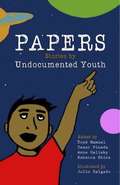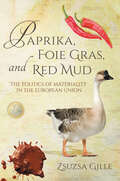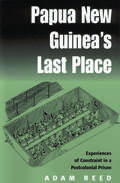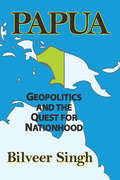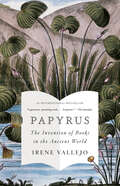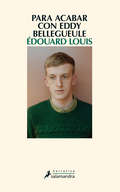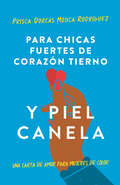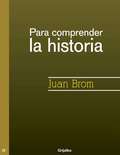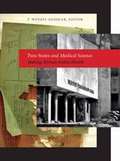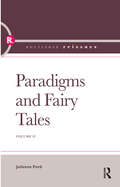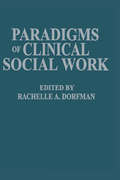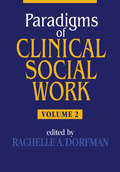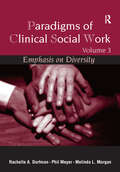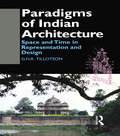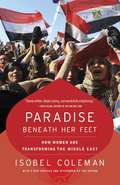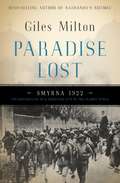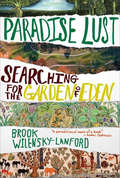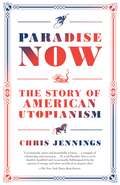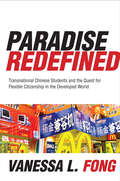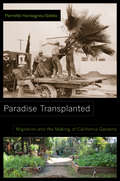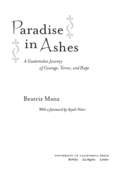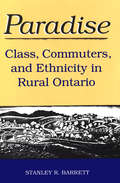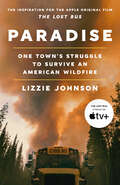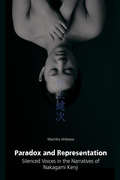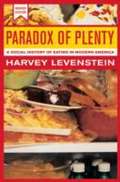- Table View
- List View
Papers: Stories by Undocumented Youth
by José Manuel Cesar Pineda Rebecca Shine Anne Galisky Julio SalgadoThis collection includes 30 stories by undocumented youth who range in age from 10-32. They were born in countries throughout the world and raised in the United States. The writers sent these stories to Graham Street Productions during the production of the documentary film, "Papers: Stories of Undocumented Youth"
Paprika, Foie Gras, and Red Mud: The Politics of Materiality in the European Union (Framing the Global)
by Zsuzsa GilleIn this original and provocative study, Zsuzsa Gille examines three scandals that have shaken Hungary since it joined the European Union: the 2004 ban on paprika due to contamination, the 2008 boycott of Hungarian foie gras by Austrian animal rights activists, and the "red mud" spill of 2010, Hungary's worst environmental disaster. In each case, Gille analyzes how practices of production and consumption were affected by the proliferation of new standards and regulations that came with entry into the EU. She identifies a new modality of power—the materialization of politics, or achieving political goals with the seemingly apolitical tools of tinkering with technology and infrastructure—and elucidates a new approach to understanding globalization, materiality, and transnational politics.
Papua New Guinea's Last Place
by Adam ReedWhat kind of experience is incarceration? How should one define its constraints? The author, who conducted extensive fieldwork in a maximum-security jail in Papua New Guinea, seeks to address these questions through a vivid and sympathetic account of inmates' lives. Prison Studies is a growing field of interest for social scientists. As one of the first ethnographic studies of a prison outside western societies and Japan, this book contributes to a reinterpretation of the field's scope and assumptions. It challenges notions of what is punitive about imprisonment by exploring the creative as well as negative outcomes of detention, separation and loss. Instead of just coping, the prisoners in Papua New Guinea's Last Place find themselves drawing fresh critiques and new approaches to contemporary living.
Papua: Geopolitics and the Quest for Nationhood
by Bilveer SinghThe Papuan conflict has been on the international radar screen since Indonesia became an independent state in 1945. Since the surrender of the territory of Papua to Indonesia in 1962, a low-intensity military conflict has been building. Most Papuans believed that their right to self-determination was sacrificed on the altar of geopolitics. Later, when East Timor seceded peacefully from Indonesia, Papuans expected the same right. When this did not happen, the conflict intensified. In this pivotal work, Bilveer Singh examines the history of the Papuan struggle, and approaches to conflict resolution through the framework of its geopolitical implications. Asserting that the Papuans were treated unjustly by Indonesia and the international community, it is not surprising that many have come down squarely on the side of Papuan independence as a way out of the imbroglio. While to some extent the Papuan's case cannot be denied, definite political and strategic realities should not be ignored. Unfortunately for the Papuans, their territory has immense geopolitical, geostrategic, and economic significance - not only for Indonesia, but also for others such as the United States, China, Australia, and a number of European countries. Papua is wealthy, under-populated and backward in terms of human resource development. Its future as a distinct entity is in real danger as the Papuans are becoming the minority in their own homeland. Due to the asymmetry of power, the Papuans' struggle has not made a breakthrough that would force Indonesia to rethink the future of the territory in any fundamental way. In order to unravel the dynamics involving Papuan separatism, this study describes the Papuan political landscape. Singh explains what makes Papua unique, and how its makeup has affected the territory's political dynamics. He analyzes the emergence of Papua as a geopolitical trophy, calling into question the degree to which Papuan nationalism has crystallized. Finally, he questions whether Papua is emerging as a regional flashpoint, and, in view of its geopolitical importance, the various options available. "Papua: Geopolitics and the Quest for Nationhood" will be of interest to scholars of international relations, comparative politics of Indonesia and the Asia-Pacific, and policymaking.
Papyrus: The Invention of Books in the Ancient World
by Irene VallejoA "masterly" (Economist), prize-winning, internationally bestselling history of books in the ancient world"Exquisite. . . . Beautifully translated into English by Charlotte Whittle, who is able to convey both Vallejo&’s passionate narrative presence and her synthesising intelligence.&” —The GuardianLong before books were mass-produced, hand-copied scrolls made from Nile River reeds were the treasures of the ancient world. Emperors and pharaohs, determined to possess them, dispatched emissaries to the edges of the known world to bring them back. Exploring the deep and fascinating history of the written word, from the oral tradition to scrolls to codices, internationally bestselling author Irene Vallejo shows that books have always been a precious and precarious vehicle for civilization.Through fascinating stories from history, insightful readings of the classics, and poignant personal reflection, Vallejo traces the dramatic history of the book and the fight for its survival. At its heart a spirited love letter to language itself, Papyrus takes readers on a journey across the centuries to discover how a simple reed grown along the banks of the Nile would give birth to a rich and cherished culture.
Para acabar con Eddy Bellegueule
by Édouard LouisUna rebelión contra el mundo, contra su familia y contra la sociedad. «Excepcional.»Livres Hebdo Salí corriendo de repente. Sólo me dio tiempo a oír a mi madre, que decía Pero ¿qué hace ese idiota? No quería estar con ellos, me negaba a compartir con ellos ese momento. Yo estaba ya lejos, había dejado de pertenecer a su mundo, la carta lo decía. Salí al campo y estuve andando gran parte de la noche: el ambiente fresco del norte, los caminos de tierra, el olor de la colza, muy intenso en esa época del año. Dediqué toda la noche a elaborar mi nueva vida, lejos de allí. «La verdad es que la rebelión contra mis padres, contra la pobreza, contra mi clase social, su racismo, su violencia, sus atavismos, fue algo secundario. Porque, antes de que me alzara contra el mundo de mi infancia, el mundo de mi infancia se había alzado contra mí. Para mi familia y los demás, me había convertido en una fuente de vergüenza, incluso de repulsión. No tuve otra opción que la huida. Este libro es un intento de comprenderla.»Édouard Louis La crítica ha dicho...«Un lenguaje contenido y a la vez brutal, sin victimismos ni exaltaciones líricas [...]. A su escritura clásica, el autor opone la lengua de su entorno, que mezcla jerga local y sintaxis rota. Efectivamente, la violencia social se ejerce con el lenguaje.»Les Inrockuptibles «Magnífico [...]. Es el anuncio de una liberación y de un renacimiento a través de las palabras para escapar de la fatalidad del determinismo social.»Le Point «Tejer un texto uniendo dos registros lingüísticos tan opuestos es más que una proeza. El éxito literario es innegable.»Le Nouvel Observateur «Una narración asombrosa, a causa de la historia personal del autor, pero también de su talento.»Madame Figaro «Excepcional. Un cóctel de Zola y Dickens. Dura, a veces casi insoportable, pero también tragicómica, en cierta medida distante, pero en absoluto maniquea.»Livres Hebdo «Es el grito de cólera de un joven que expresa su asco frente al mito tenaz que convierte al proletariado en una bestia valiente, de buen corazón y amante de la vida.»Catherine Simon, Le Monde des Livres «La escritura de Édouard Louis, con su obstinación en hablar de la vergüenza, demuestra que su libro, que cae como un mazo sobre personas concretas, revela un escándalo universal de primera magnitud.»Jean Birnbaum, Le Monde des Livres
Para chicas fuertes de corazón tierno y piel canela: Una carta de amor para mujeres de color
by Prisca Dorcas Mojica Rodríguez“A través de su íntima manera de narrar y su cálido abrazo a las mujeres de color para quienes escribe, Mojica Rodríguez también abraza dulcemente a los lectores y los invita a transitar el duro camino a la liberación” —POPSUGAR LATINA “Provocador e iluminador. Bella y honestamente escrito, llegará al corazón de las mujeres de color que trabajan por la justicia y la equidad” —SEATTLE BOOK REVIEW Durante generaciones, las mujeres de color han tenido que luchar contra las poderosas fuerzas del sexismo, el racismo y el clasismo; una lucha bastante solitaria. Cuando Prisca Dorca Mojicas fundó Latina Rebels, creó también una comunidad que las ayuda a pelear juntas. Lo hizo de nuevo con este libro. Para chicas fuertes, de corazón tierno y piel canela ofrece sabiduría y caminos de liberación, maneras poderosas de enfrentar diversos retos y empodera a las mujeres para que desafíen la narrativa blanca y masculina contando sus propias historias. Esta es una guía hacia el orgullo y hermandad para las mujeres de piel canela y piel negra, una herramienta necesaria para avivar todo un movimiento. Tal vez prenda una chispa dentro de ti.
Para comprender la historia
by Juan BromEn el presente trabajo, cuidadosamente revisado y actualizado, Juan Brom busca "facilitar la comprensión de la Historia a quien desee una visión general y asimismo al que quiera considerar o profundizar en algún aspecto especifico". Ésta es, como todas sus obras, una invitación a reflexionar sobre nuestro pasado y sobre la importancia que éste tiene para entender mejor el mundo actual; para ello nos expone las características de la Historia como disciplina del saber, nos enseña los grandes periodos del desarrollo humano y nos da una visión de las regularidades que pueden desprenderse de su estudio. Este libro es un texto imprescindible para todos aquellos estudiosos de las Ciencias Sociales y para cualquier persona interesada en comprender mejor al ser humano y su historia. Para comprender la Historia tuvo su origen en el curso "Fundamentos de la Historia", que el autor impartió en 1962 en la universidad michoacana de San Nicolás de Hidalgo, y de 1965 a 1968 en la Universidad Autónoma de Puebla. Fue publicado en 1972 por la Editorial Nuestro Tiempo, alcanzando ahí, con varias revisiones, un tiraje total de 430.000 ejemplares hasta el año 2002, en que dejó de existir dicha editorial.
Para-States and Medical Science: Making African Global Health
by Paul Wenzel GeisslerIn Para-States and Medical Science, P. Wenzel Geissler and the contributors examine how medicine and public health in Africa have been transformed as a result of economic and political liberalization and globalization, intertwined with epidemiological and technological changes. The resulting fragmented medical science landscape is shaped and sustained by transnational flows of expertise and resources. NGOs, universities, pharmaceutical companies and other nonstate actors now play a significant role in medical research and treatment. But as the contributors to this volume argue, these groups have not supplanted the primacy of the nation-state in Africa. Although not necessarily stable or responsive, national governments remain crucial in medical care, both as employers of health care professionals and as sources of regulation, access, and - albeit sometimes counterintuitively - trust for their people. "The state" has morphed into the "para-state" -- not a monolithic and predictable source of sovereignty and governance, but a shifting, and at times ephemeral, figure. Tracing the emergence of the "global health" paradigm in Africa in the treatment of HIV, malaria, and leprosy, this book challenges familiar notions of African statehood as weak or illegitimate by elaborating complex new frameworks of governmentality that can be simultaneously functioning and dysfunctional.Contributors. Uli Beisel, Didier Fassin, P. Wenzel Geissler, Rene Gerrets, Ann Kelly, Guillaume Lachenal, John Manton, Lotte Meinert, Vinh-Kim Nguyen, Branwyn Poleykett, Susan Reynolds Whyte
Paradigms and Fairy Tales: Volume 2
by Julienne FordThis book is an introduction to the epistemology and practice of social science. It provides an exposition and critique of the ideology and practice of social science, and an examination of the professional social scientist as a manipulator of ideas and appearances.
Paradigms of Clinical Social Work
by Rachelle A. DorfmanThis fully-integrated volume written by the leading experts in the field of social work presents a wide rage of therapeutic paradigms. Especially noteworthy is the common framework provided for all paradigms discusse, thus facilitating comparison and contrast between each approach. These paradigms include cognitive, brief-oriented, and psychosocial therapies, as well as Adlerian theory and radical behavorism.
Paradigms of Clinical Social Work: Emphasis On Diversity
by Rachelle A. DorfmanThis book provokes sociological questions about the expanding number of paradigms of clinical social work and the application of clinical theory. It enhances clinical social workers' ability to make sense of people's lives so that we may help them in their struggles.
Paradigms of Clinical Social Work: Emphasis on Diversity
by Rachelle A. Dorfman-Zukerman Melinda L. Morgan Phil MeyerDesigned to mirror how social work theory and practice is taught, Paradigms of Clinical Social Work, Volume 3 presents new therapeutic models through an imaginary family experiencing common social work problems.
Paradigms of Indian Architecture: Space and Time in Representation and Design
by G. H. TillotsonThis book explores conceptions of Indian architecture and how the historical buildings of the subcontinent have been conceived and described. Investigating the design philosophies of architects and styles of analysis by architectural historians, the book explores how systems of design and ideas about aesthetics have governed both the construction of buildings in India and their subsequent interpretation.How did the political directives of the British colonial period shape the manner in which pioneer archaeologists wrote the histories of India's buildings? How might such accounts conflict with indigenous ones, or with historical aesthetics? How might paintings of buildings by British and Indian artists suggest different ways of understanding their subjects? In what ways must we revise our conceptions of space and time to understand the narrative art which adorns India's most ancient monuments? These are among the questions addressed by the contributors to the volume.
Paradise Beneath Her Feet: How Women are Transforming the Middle East
by Isobel ColemanThrough the remarkable stories of women from five countries, Coleman reveals how women, working within Islam, are transforming the Middle East.
Paradise Lost
by Giles MiltonOn Saturday, September 9, 1922, the victorious Turkish cavalry rode into Smyrna, the richest and most cosmopolitan city in the Ottoman Empire. The city’s vast wealth created centuries earlier by powerful Levantine dynasties, its factories teemed with Greeks, Armenians, Turks, and Jews. Together, they had created a majority Christian city that was unique in the Islamic world. But to the Turkish nationalists, Smyrna was a city of infidels. In the aftermath of the First World War and with the support of the Great Powers, Greece had invaded Turkey with the aim of restoring a Christian empire in Asia. But by the summer of 1922, the Greeks had been vanquished by Atatürk’s armies after three years of warfare. As Greek troops retreated, the non-Muslim civilians of Smyrna assumed that American and European warships would intervene if and when the Turkish cavalry decided to enter the city. But this was not to be. On September 13, 1922, Turkish troops descended on Smyrna. They rampaged first through the Armenian quarter, and then throughout the rest of the city. They looted homes, raped women, and murdered untold thousands. Turkish soldiers were seen dousing buildings with petroleum. Soon, all but the Turkish quarter of the city was in flames and hundreds of thousands of refugees crowded the waterfront, desperate to escape. The city burned for four days; by the time the embers cooled, more than 100,000 people had been killed and millions left homeless. Based on eyewitness accounts and the memories of survivors, many interviewed for the first time, Paradise Lost offers a vivid narrative account of one of the most vicious military catastrophes of the modern age.
Paradise Lust: Searching for the Garden of Eden
by Brook Wilensky-LanfordIt seems that ever since mankind was kicked out of the Garden of Eden for eating the forbidden fruit, we’ve been trying to get back in. Or at least, we’ve been wondering where the Garden might have been. St. Augustine had a theory, and so did medieval monks, John Calvin, and Christopher Columbus. But when Darwin’s theory of evolution permanently altered our understanding of human origins, shouldn’t the search for a literal Eden have faded away? Not so fast. In Paradise Lust, Brook Wilensky-Lanford introduces readers to the enduring modern quest to locate the Garden of Eden on Earth. It is an obsession that has consumed Mesopotamian archaeologists, German Baptist ministers, British irrigation engineers, and the first president of Boston University, among many others. These quixotic Eden seekers all started with the same brief Bible verses, but each ended up at a different spot on the globe: Florida, the North Pole, Ohio, China, and, of course, Iraq. Evocative of Tony Horwitz and Sarah Vowell, Wilensky-Lanford writes of these unusual characters and their search with sympathy and wit. Charming, enlightening, and utterly unique, Paradise Lust is a century-spanning history that will take you to places you never imagined.
Paradise Now
by Chris JenningsFor readers of Jill Lepore, Joseph J. Ellis, and Tony Horwitz comes a lively, thought-provoking intellectual history of the golden age of American utopianism--and the bold, revolutionary, and eccentric visions for the future put forward by five of history's most influential utopian movements. In the wake of the Enlightenment and the onset of industrialism, a generation of dreamers took it upon themselves to confront the messiness and injustice of a rapidly changing world. To our eyes, the utopian communities that took root in America in the nineteenth century may seem ambitious to the point of delusion, but they attracted members willing to dedicate their lives to creating a new social order and to asking the bold question What should the future look like? In Paradise Now, Chris Jennings tells the story of five interrelated utopian movements, revealing their relevance both to their time and to our own. Here is Mother Ann Lee, the prophet of the Shakers, who grew up in newly industrialized Manchester, England--and would come to build a quiet but fierce religious tradition on the opposite side of the Atlantic. Even as the society she founded spread across the United States, the Welsh industrialist Robert Owen came to the Indiana frontier to build an egalitarian, rationalist utopia he called the New Moral World. A decade later, followers of the French visionary Charles Fourier blanketed America with colonies devoted to inaugurating a new millennium of pleasure and fraternity. Meanwhile, the French radical Étienne Cabet sailed to Texas with hopes of establishing a communist paradise dedicated to ideals that would be echoed in the next century. And in New York's Oneida Community, a brilliant Vermonter named John Humphrey Noyes set about creating a new society in which the human spirit could finally be perfected in the image of God. Over time, these movements fell apart, and the national mood that had inspired them was drowned out by the dream of westward expansion and the waking nightmare of the Civil War. Their most galvanizing ideas, however, lived on, and their audacity has influenced countless political movements since. Their stories remain an inspiration for everyone who seeks to build a better world, for all who ask, What should the future look like?Advance praise for Paradise Now"Chris Jennings is a natural storyteller, and his Paradise Now, a five-part chronicle of America's nineteenth-century utopian dreamers and doers, is the most clear-eyed, sympathetic, and inspiring account I've read of this vital chapter in American history in decades."--Megan Marshall, Pulitzer Prize-winning author of Margaret Fuller: A New American Life "Jennings knows how to tell a story, and has the intellectual range to recover both the weirdness and wisdom of America's brief bout with utopian illusions and ideals."--Joseph J. Ellis, author of The Quartet: Orchestrating the Second American Revolution, 1783-1789"With good humor, a lively style, and a deep knowledge of the historical scholarship, Chris Jennings tells the goofy, heartbreaking tale of nineteenth-century Americans who believed they could bring about heaven on earth, and managed to live out futures that the rest of us haven't yet reached."--Caleb Crain, author of Necessary Errors"Readers who resent the constraints of a barren realism will value this deep-probing inquiry into the quest for new social possibilities."--Booklist (starred review) "Jennings proves an able guide to these groups. [His] comprehensive research makes for absorbing reading."--Kirkus ReviewsFrom the Hardcover edition.
Paradise Redefined
by Vanessa L. FongIn 2004, Vanessa Fong offered a groundbreaking ethnographic exploration of the social, economic, and psychological development of children born since China's one-child policy was introduced in 1979. Her book Only Hope left readers with a picture of stressed, ambitious adolescents for whom elite status was the ultimate goal, though relatively few were in a position to achieve it. In Paradise Redefined, Fong tracks the experiences of many in her initial cohort of Chinese only-children—now college-age—as they study abroad in Australia, Europe, Japan, New Zealand, North America, and Singapore. While earning a prestigious college education in China is the main path to elite status, study abroad provides an alternative channel by offering a particularly flexible "developed world" citizenship. This flexible citizenship promises the potential for greater happiness and freedom afforded by transnational mobility, but also brings with it unexpected suffering, ambivalence, and disappointment. Paradise Redefined offers insights into China's globalization by examining the expectations and experiences that affect how various Chinese students make decisions about studying abroad, staying abroad, immigration, and returning home.
Paradise Transplanted
by Pierrette Hondagneu-SoteloGardens are immobile, literally rooted in the earth, but they are also shaped by migration and by the transnational movement of ideas, practices, plants, and seeds. In Paradise Transplanted, Pierrette Hondagneu-Sotelo reveals how successive conquests and diverse migrations have made Southern California gardens, and in turn how gardens influence social inequality, work, leisure, status, and our experiences of nature and community. Drawing on historical archival research, ethnography, and over one hundred interviews with a wide range of people including suburban homeowners, paid Mexican immigrant gardeners, professionals at the most elite botanical garden in the West, and immigrant community gardeners in the poorest neighborhoods of inner-city Los Angeles, this book offers insights into the ways that diverse global migrations and garden landscapes shape our social world.
Paradise in Ashes: A Guatemalan Journey of Courage, Terror, and Hope
by Beatriz ManzParadise in Ashes is a deeply engaged and moving account of the violence and repression that defined the murderous Guatemalan civil war of the 1980s. In this compelling book, Beatriz Manz—an anthropologist who spent over two decades studying the Mayan highlands and remote rain forests of Guatemala—tells the story of the village of Santa María Tzejá, near the border with Mexico. Manz writes eloquently about Guatemala's tortured history and shows how the story of this village—its birth, destruction, and rebirth—embodies the forces and conflicts that define the country today. Drawing on interviews with peasants, community leaders, guerrillas, and paramilitary forces, Manz creates a richly detailed political portrait of Santa María Tzejá, where highland Maya peasants seeking land settled in the 1970s. Manz describes these villagers' plight as their isolated, lush, but deceptive paradise became one of the centers of the war convulsing the entire country. After their village was viciously sacked in 1982, desperate survivors fled into the surrounding rain forest and eventually to Mexico, and some even further, to the United States, while others stayed behind and fell into the military's hands. With great insight and compassion, Manz follows their flight and eventual return to Santa María Tzejá, where they sought to rebuild their village and their lives.
Paradise: Class, Commuters, and Ethnicity in Rural Ontario
by Stanley BarrettWhat was life like in the 1950s in small communities in Ontario? Lower-class and upper-class residents might have different memories of those days, but on one thing they would agree: it is a much different world in rural Ontario today. The old guard has lost most of its power, displaced partly by 'big brother' in the form of bureaucracy, and new comers from the city in search of affordable housing--even if it means commuting daily to work. Unlike their British-origin predecessors, the newcomers who have begun to appear in the countryside represent a wide range of ethnic and economic backgrounds.Paradise concentrates on the transformed class system of one community in rural Ontario. In a comparison of the decade following the First World War and the 1980s, Stanley R. Barrett analyses the changing face and structure of a town as it has had to adapt to modern social and economic realities. Particular attention is paid to the phenomenon of the commuter in search of affordable housing and the influx of immigrants of varied ethnic backgrounds, and the interaction between these newcomers and long-term residents. What is striking is just how massive the changes in small-town Ontario have been since the Second World War--to the extent of almost obliterating long-assumed distinctions between rural and urban society.
Paradise: One Town's Struggle to Survive an American Wildfire
by Lizzie JohnsonThe definitive firsthand account of California&’s Camp Fire, the nation&’s deadliest wildfire in a century, Paradise is a riveting examination of what went wrong and how to avert future tragedies as the climate crisis unfolds&“A reportorial tour de force.&”—Erik Larson, author of The Splendid and the Vile On November 8, 2018, the people of Paradise, California, awoke to a mottled gray sky and gusty winds. Soon the Camp Fire was upon them, gobbling an acre a second. Less than two hours after the fire ignited, the town was engulfed in flames, the residents trapped in their homes and cars. By the next morning, eighty-five people were dead.As a reporter for the San Francisco Chronicle, Lizzie Johnson was there as the town of Paradise burned. She saw the smoldering rubble of a historic covered bridge and the beloved Black Bear Diner and she stayed long afterward, visiting shelters, hotels, and makeshift camps. Drawing on years of on-the-ground reporting and reams of public records, including 911 calls and testimony from a grand jury investigation, Johnson provides a minute-by-minute account of the Camp Fire, following residents and first responders as they fight to save themselves and their town. We see a young mother fleeing with her newborn; a school bus full of children in search of an escape route; and a group of paramedics, patients, and nurses trapped in a cul-de-sac, fending off the fire with rakes and hoses.In Paradise, Johnson documents the unfolding tragedy with empathy and nuance. But she also investigates the root causes, from runaway climate change to a deeply flawed alert system to Pacific Gas and Electric&’s decades-long neglect of critical infrastructure. A cautionary tale for a new era of megafires, Paradise is the gripping story of a town wiped off the map and the determination of its people to rise again.
Paradox and Representation: Silenced Voices in the Narratives of Nakagami Kenji
by Machiko IshikawaHow can the "voiceless" voice be represented? This primary question underpins lshikawa's analysis of selected work by Buraku writer, Nakagami Kenji (1946-1992). In spite of his Buraku background, Nakagami's privilege as a writer made it difficult for him to "hear" and "represent" those voices silenced by mainstream social structures in Japan. This "paradox of representing the silenced voice" is the key theme of the book. Gayatri Spivak theorizes the (im)possibility of representing the voice of "subalterns," those oppressed by imperialism, patriarchy and heteronomativity. Arguing for Burakumin as Japan's "subalterns," Ishikawa draws on Spivak to analyze Nakagami' s texts.The first half of the book revisits the theme of the transgressive Burakumin man. This section includes analysis of a seldom discussed narrative of a violent man and his silenced wife. The second half of the book focuses on the rarely heard voices of Burakumin women from the Akiyuki trilogy. Satoko, the prostitute, unknowingly commits incest with her half-brother, Akiyuki. The aged Yuki sacrifices her youth in a brothel to feed her fatherless family. The mute Moyo remains traumatized by rape. lshikawa' s close reading of Nakagami's representation of the silenced voices of these sexually stigmatized women is this book's unique contribution to Nakagami scholarship.
Paradox of Plenty: A Social History of Eating in Modern America
by Harvey LevensteinIn this sweeping history of food and eating in modern America, Harvey Levenstein explores the social, economic, and political factors that have shaped the American diet since 1930.
